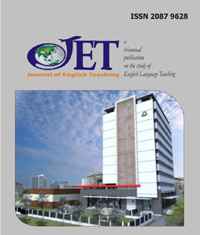Preparing Preservice English Language Teachers to Teach at Unprecedented Times: The Case of Turkey
Abstract
COVID-19 has impacted education negatively to a certain extent by suspending schools and universities, ending face-to-face and practical education, and causing a rapid transition to distance education. These changes have led to several negative effects on teachers and students such as anxiety, stress, and depression, which demonstrates the importance of teacher preparedness to teach at unprecedented times such as COVID-19. Therefore, assessing and evaluating teacher preparedness has become significant. One way to do this is to evaluate teacher education programs with a new perspective developed considering the effects of COVID-19 on education. Therefore, the present study aimed to find out how teacher education programs can prepare teachers to teach at unprecedented times by focusing on the English language teacher education program (ELTEP) of Turkey. It was designed as a qualitative study in which the ELTEP of Turkey was used as the data collection tool. The collected data were content analyzed. The findings have shown that the ELTEP of Turkey can prepare preservice English language teachers to teach at unprecedented times through three psychological courses, five technology courses, and 21 pedagogical courses. The findings were discussed, and suggestions for further studies were made.
References
Al Lily, A. E., Ismail, A. F., Abunasser, F. M., & Alqahtani, R. H. A. (2020). Distance education as a response to pandemics: Coronavirus and Arab culture. Teaching in Society, 63, 1-11.
Alqurshi, A. (2020). Investigating the impact of COVID-19 lockdown on pharmaceutical education in Saudi Arabia – a call for a remote teaching contingency strategy. Saudi Pharmaceutical Journal, 28, 1075-1083.
Basilaia, G., & Kvavadze, D. (2020). Transition to online education in schools during a Sars-CoV-2 Coronavirus (COVID-19) pandemic in Georgia. Pedagogical Research, 5(4), 1-9.
Carlson, E. R. (2020). COVID-19 and educational engagement. Journal of Oral and Maxillofacial Surgery, 78, 1049-1051.
Chapay, M. B. (2020). Reshaping assessment practices in a Philippine teacher education institution during the Coronavirus disease 2019 crisis. Pedagogical Research, 5(4), 1-7.
Ciğerci, F. M. (2020). Slowmation experiences of pre-service teachers via distance education during the COVID-19 pandemic disease. International Online Journal of Primary Education, 9(1), 111-127.
Creswell, J. W. (2007). Qualitative inquiry & research design: Choosing among five approaches (2nd ed.). Thousand Oaks, California, the United States of America: Sage Publications.
Creswell, J. W. (2014). Research design: Qualitative, quantitative, and mixed methods approaches (4th ed.). Thousand Oaks, California, the United States of America: Sage Publications Inc.
de Oliveira Araújo, F. J., de Lima, L. S. A., Cidade, P. I. M., Nobre, C. B., & Neto, M. L. R. (2020). Impact of Sars-Voc-2 and its reverberation in global higher education and mental health. Psychiatry Research, 288, 1-2.
Dilmaç, S. (2020). Students’ opinions about the distance education to art and design courses in the pandemic process. World Journal of Education, 10(3), 113-126.
Kaden, U. (2020). COVID-19 school closure-related changes to the professional life of a k-12 teacher. Education Sciences, 10, 1-13.
Keswani, R. N., Sethi, A., Repici, A., Messmann, H., & Chiu, P. W. (2020). How to maximize trainee education during the Coronavirus disease-2019 pandemic: Perspectives from around the world. Gastroenterology, 159(1), 26-29.
Krishnamurthy, S. (2020). The future of business education: A commentary in the shadow of the Covid-19 pandemic. Journal of Business Research, 117, 1-5.
Lee, K. S., & Zhang, J. J. Y. (2020). Letter to the editor: “Medical student concerns relating to neurosurgery education during COVID-19.” World Neurosugery, 140, 484-485.
Louis-Jean, J., & Cenat, K. (2020). Beyond the face-to-face learning: A contextual analysis. Pedagogical Research, 5(4), 1-4.
Murphy, L., Eduljee, N. B., & Croteau, K. (2020). College student transition to synchronous virtual classes during the COVID-19 pandemic in Northeastern United States. Pedagogical Research, 5(4), 1-10.
Nasr, N. (2020). Teachers as students: Adapting to online methods of instruction and assessment in the age of COVID-19. Electronic Journal for Research in Science & Mathematics Education, 24(2), 168-171.
Nepal, R., & Rogerson, A. M. (2020). From theory to practice of promoting student engagement in business and law-related disciplines: The case of undergraduate economic education. Education Sciences, 10, 1-13.
Plancher, K. D., Shanmugam, J. P., & Petterson, S. C. (2020). The changing face of orthopaedic education: Searching for the new reality after COVID-19. Arthroscopy, Sports Medicine, and Rehabilitation, 2(4), 295-298.
Radwan, A., & Radwan, E. (2020). Social and economic impact of school closure during the outbreak of the COVID-19 pandemic: A quick online survey in the Gaza strip. Pedagogical Research, 5(4), 1-5.
Sá, M. J., & Serpa, S. (2020). The global crisis brought about by SARS-CoV-2 and its impacts on education: An overview of the Portuguese panorama. Science Insights Education Frontiers, 5(2), 525-530.
Sani, I., Hamza, Y., Chedid, Y., Amalendran, J., & Hamza, N. (2020). Understanding the consequence of COVID-19 on undergraduate medical education: Medical students’ perspective. Annals of Medicine and Surgery, 58, 117-119.
Thapa, S., Rai, N., Adhikari, J., Ghimire, A., Limbu, A. K., Joshi, A., & Adhikari, S. (2020). Impact of COVID-19 lockdown on agriculture education in Nepal: An online survey. Pedagogical Research, 5(4), 1-6.
The Higher Education Council of Turkey. (2018). İngilizce Öğretmenliği Lisans Programı (English Language Teacher Education Program). Retrieved from https://www.yok.gov.tr/Documents/Kurumsal/egitim_ogretim_dairesi/Yeni-Ogretmen-Yetistirme-Lisans-Programlari/Ingilizce_Ogretmenligi_Lisans_Programi.pdf
Toquero, C. M. (2020). The challenges and opportunities for higher education amid the COVID-19 pandemic: The Philippine context. Pedagogical Research, 5(4), 1-5.
Uluöz, E. (2020). Opinions of the faculty of sport sciences students on the changes in education system during COVID-19 pandemic: A qualitative study. African Educational Research Journal, 8(3), 481-490.
Yates, A., Brindley-Richards, W., & Thistoll, T. (2020). Student engagement in distance-based vocational education. Journal of Open, Flexible and Distance Learning, 18(2), 29-44.
Yıldırım, A., & Şimşek, H. (2013). Sosyal bilimlerde nitel araştırma yöntemleri [Research methods in social sciences] (9th ed.). Ankara: Seçkin Yayıncılık.
- View 500 times Download 500 times pdf
Copyright (c) 2021 JET (Journal of English Teaching)

This work is licensed under a Creative Commons Attribution-NonCommercial-NoDerivatives 4.0 International License.
Copyrights for articles published in JET are retained by the authors, with first publication rights granted to the journal. The journal/publisher is not responsible for subsequent uses of the work. It is the author's responsibility to bring an infringement action if so desired by the author.







